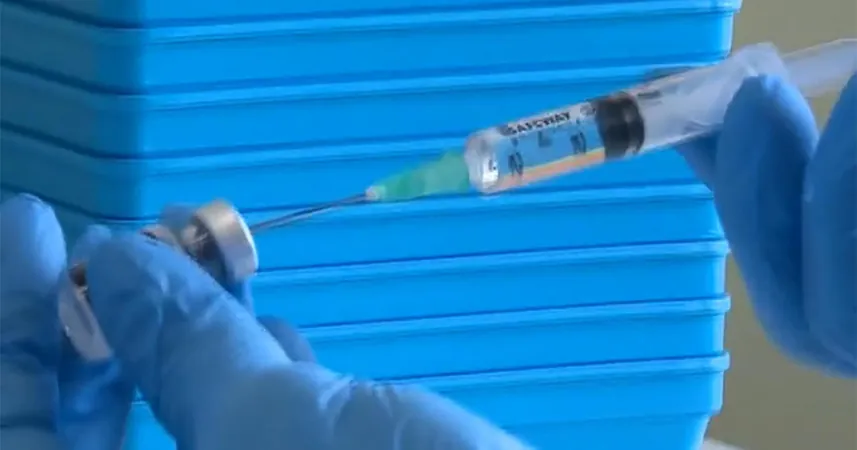
Surge in Vaccine Skepticism Threatens Hard-Won Progress Against Measles and Other Diseases
2024-09-15
Author: Lok
As a result of widespread vaccination efforts, measles was declared eliminated in the United States in the year 2000. However, recent reports indicate a troubling resurgence, with cases emerging in states from California to Vermont. Experts attribute this uptick in measles cases, in part, to an alarming increase in the number of parents opting out of routine immunizations for their children in 2023.
Dr. Howard Markel, a prominent medical historian previously affiliated with the University of Michigan, expresses his disbelief at the volume of anti-vaccine sentiment prevailing in society today. He states, "There's never been a better time in human history to tackle infectious diseases than today. We're armed with vaccines, antivirals, and antibiotics, yet skepticism towards vaccines is proliferating."
Understanding Measles: A Deadly, Contagious Virus
Measles is not just a mild childhood illness; it poses significant health risks, including potentially fatal complications. The rising trend of vaccine hesitancy can be traced back as far as America itself. Dr. Markel explains that vaccine resistance began during the smallpox outbreaks of the 1700s, when early immunization methods were fraught with danger and uncertainty.
Notably, Benjamin Franklin famously regretted not immunizing his son against smallpox, who subsequently died from the disease. Throughout the 1800s, with the development of a safer smallpox vaccine, many states began mandating vaccinations, sparking debates that echo in today's discourse.
The Polio Epidemic and the Rise of Vaccine Acceptance
The mass hysteria surrounding polio in the 1950s led to an overwhelming support for vaccinations, after Dr. Jonas Salk developed a vaccine that effectively quelled the fears of paralysis associated with the virus. This was a high point for vaccine acceptance, with widespread immunization drastically decreasing rates of measles, mumps, rubella, and other diseases.
However, the counterculture movement of the 1960s began to sow seeds of doubt about vaccines. As more efforts were made to promote vaccination, questions arose concerning the development, ingredients, and necessity of vaccines, resulting in a notable shift in public opinion.
The controversy intensified after a now-discredited 1998 study falsely linked the measles vaccine to autism, leading to a significant decline in vaccination rates. Although the study was retracted 12 years later, its harmful effects continue to resonate today.
A Fight Against Misinformation
Dr. Peter Hotez, a vaccine researcher and advocate from Baylor College of Medicine, warns that the anti-vaccine sentiment is not merely anecdotal; it's a well-organized movement with political motives. He underscores that the pandemic has amplified vaccine skepticism, asserting that misinformation is tirelessly propagated by both established anti-vaccine activists and political figures.
Hotez highlights that vaccine-related skepticism extends beyond measles, warning of the far-reaching consequences of vaccine refusal. An estimated 200,000 American lives have been lost due to COVID-19 vaccine hesitancy, which he attributes to a broader war against biomedical science.
The Need for Understanding and Action
Elena Conis, a medical historian, expresses concerns about the consistent emergence of vaccine resistance in tandem with increased vaccination mandates. She emphasizes the necessity of recognizing and addressing the underlying distrust many people harbor regarding vaccines.
Experts emphasize the urgency of action, noting that emerging threats such as COVID-19 and other viruses signal an impending crisis. Dr. Hotez warns, "Mother Nature is making it clear that pandemics will continue to occur, and it's imperative that we rally public support for vaccinations to prevent unprecedented devastation."
In this critical moment, experts call for improved communication and educational initiatives to counter misinformation and restore public trust in vaccines to protect children and communities from preventable diseases.
As discussions about vaccine hesitancy rage on, historical context, personal stories, and evolving scientific consensus serve as crucial tools to fight the current anti-vaccine tide. The collective health of society may depend on our ability to navigate these challenges together.




 Brasil (PT)
Brasil (PT)
 Canada (EN)
Canada (EN)
 Chile (ES)
Chile (ES)
 Česko (CS)
Česko (CS)
 대한민국 (KO)
대한민국 (KO)
 España (ES)
España (ES)
 France (FR)
France (FR)
 Hong Kong (EN)
Hong Kong (EN)
 Italia (IT)
Italia (IT)
 日本 (JA)
日本 (JA)
 Magyarország (HU)
Magyarország (HU)
 Norge (NO)
Norge (NO)
 Polska (PL)
Polska (PL)
 Schweiz (DE)
Schweiz (DE)
 Singapore (EN)
Singapore (EN)
 Sverige (SV)
Sverige (SV)
 Suomi (FI)
Suomi (FI)
 Türkiye (TR)
Türkiye (TR)
 الإمارات العربية المتحدة (AR)
الإمارات العربية المتحدة (AR)